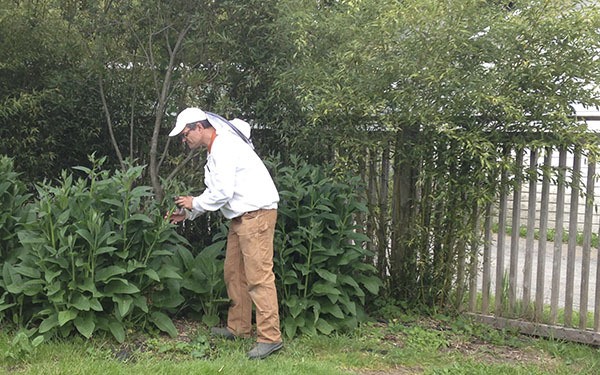At a time when the decline of the bee population is frequently in the news, one islander has begun creating a garden specifically for bees and other pollinators.
Gene Kuhns, who is a beekeeper himself, recently obtained a $900 grant from his employer, McDonald Miller, for the project, which will be located in a far corner of the Village Green.
“We want to attract as many butterflies and native bees as possible,” he said.
Just as important as the plants themselves, Kuhns said, will be the educational component of the garden. A placard with information will be included, showing the life cycle of butterflies and bees and explaining how habitat loss and the misuse of chemicals have affected pollinators. Kuhns added he hopes that the garden will inspire islanders to plant with bees and butterflies in mind and include plants that bloom from spring through fall.
“We are trying to encourage every property owner to dedicate a piece of their property to pollinator habitat,” he added.
One-third of our food sources are dependent on pollinators, he said, making it vital that people recognize their importance.
“If we do not do more to restore habitat and diminish chemical use, we are going to be hurting, not just on Vashon, but the human population as a whole,” he said.
Kuhns has been working with the Vashon Island Growers Association (VIGA) on the project, and Margot Boyer, VIGA’s secretary and a beekeeper, is serving as the groups liaison.
Boyer noted that VIGA’s mission is to promote agriculture, and a pollinator garden fits into that picture well. Native bees pollinate native plants, she said, but honeybees, which were imported with European settlers, are needed to pollinate many agricultural crops, including what many think of as common, local foods, such as apples.
“You cannot have apples without honeybees,” she added.
Both Boyer and Kuhns stress that the public need not worry about getting stung. While hornets and wasps are prone to stinging, honeybees only sting when they or their hives are threatened, Kuhns said.
“I can stand or work for hours in the garden very near our hive with honeybees buzzing all around me and never get stung,” he said.
Kuhns is now working with local vendors to buy the plants he will use, including native plants, sunflowers and coneflowers. However, he said he would appreciate plants that islanders may wish to donate. He also welcomes volunteers, including children, to help plant, with an event scheduled for this Saturday during the farmers market. The event will include a raffle for a professionally installed pollinator garden at the winner’s home. Volunteers should stop by between 10 a.m. and 2 p.m. at the Village Green.


